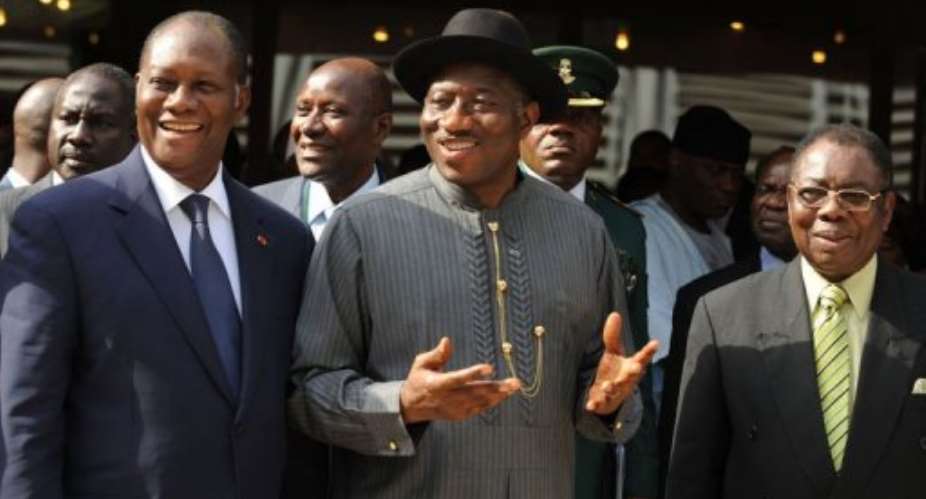ABUJA (AFP) - Ivory Coast's president was named the new head of West Africa's regional bloc on Friday at a summit dominated by a security crisis in the Sahel that a rights group said could spark chaos in the desert region.
President Alassane Ouattara was "unanimously" chosen to lead the Economic Community of West African States (ECOWAS), the body's outgoing chairman, Goodluck Jonathan of Nigeria, said before the close of a two-day meet.
His nomination to head the 15-nation bloc was described as a move aimed at showing support for Ivory Coast, still emerging from a brutal post-election crisis.
"Through this election, you once again show the support ... of our organisation to Ivory Coast in its efforts at reconciliation and reconstruction," said Ouattara, a former International Monetary Fund economist.
One year ago, Ouattara, 70, was largely confined to an Abidjan hotel by his political foe, ex-president Laurent Gbagbo, who had refused to accept defeat after a November 2010 vote.
Gbagbo's refusal to quit triggered conflict which left around 3,000 people dead before Ouattara took power. Gbagbo is now awaiting trial by the International Criminal Court, accused of crimes against humanity.
After the ECOWAS summit, Ouattara was expected to head to Benin, where African leaders will gather on Saturday for talks on worsening insecurity in the Sahel region that stretches across Africa south of the Sahara.
ECOWAS "strongly condemned" a fresh offensive launched by Tuareg rebels in northern Mali, which the UN refugee agency said has forced more than 44,000 people to flee into neighbouring Burkina Faso, Mauritania and Niger.
At least 60,000 have been displaced within Mali, the International Committee for the Red Cross said Friday.
Global rights watchdog Amnesty International said on Friday the escalating fighting between the Tuareg rebels and the forces of ECOWAS-member Mali could plunge the region "into chaos."
"This is the worst human rights crisis in northern Mali for 20 years," said Gaetan Mootoo, Amnesty's West Africa researcher.
In the summit's closing statement, ECOWAS called for "an immediate and unconditional cessation of hostilities by the rebels," and "ordered them to immediately surrender all occupied zones in" Mali.
Tuareg rebels, boosted by the return of those who had been fighting for Moamer Kadhafi in Libya, launched an offensive on January 17 and have attacked several northern towns as they demand autonomy for their nomadic desert tribe.
The summit ordered an urgent meeting of military chiefs from the ECOWAS bloc to review the "emerging security threats" in the Sahel and the Gulf of Guinea, which has been hit by rising piracy.
There has been speculation that some African leaders will also use the weekend meeting in Benin's economic capital Cotonou to revisit a contested election that saw African Union (AU) commission chief Jean Ping narrowly retain his post.
At a summit last month, the 54-member AU was deadlocked over ex-South African foreign minister Nkosazana Dlamini-Zuma's bid to claim Ping's job, a race that exposed divides between geographical regions and French- and English-speaking Africa.
The weekend meeting was called by the AU's new chairman, Benin's President Thomas Boni Yayi.





 Meta releases new version of conversational AI across its platforms
Meta releases new version of conversational AI across its platforms
 Cape Town named Africa’s Best Airport 2024 by Skytrax
Cape Town named Africa’s Best Airport 2024 by Skytrax
 Bono East: Four injured after hearse transporting corpse crashes into a truck
Bono East: Four injured after hearse transporting corpse crashes into a truck
 ‘Be courageous, find your voice to defend our democracy’ — Sam Jonah urges journ...
‘Be courageous, find your voice to defend our democracy’ — Sam Jonah urges journ...
 Exodus of doctors, nurses and teachers have worsened because of unserious Akufo-...
Exodus of doctors, nurses and teachers have worsened because of unserious Akufo-...
 2024 election: Avoid insults, cutting down people in search of power – National ...
2024 election: Avoid insults, cutting down people in search of power – National ...
 ‘You passed through the back door but congratulations’ — Atubiga on Prof Jane Na...
‘You passed through the back door but congratulations’ — Atubiga on Prof Jane Na...
 Government’s $21.1 billion added to the stock of public debt has been spent judi...
Government’s $21.1 billion added to the stock of public debt has been spent judi...
 Akufo-Addo will soon relocate Mahama’s Ridge Hospital to Kumasi for recommission...
Akufo-Addo will soon relocate Mahama’s Ridge Hospital to Kumasi for recommission...
 We must not compromise on our defence of national interest; this is the time to ...
We must not compromise on our defence of national interest; this is the time to ...
